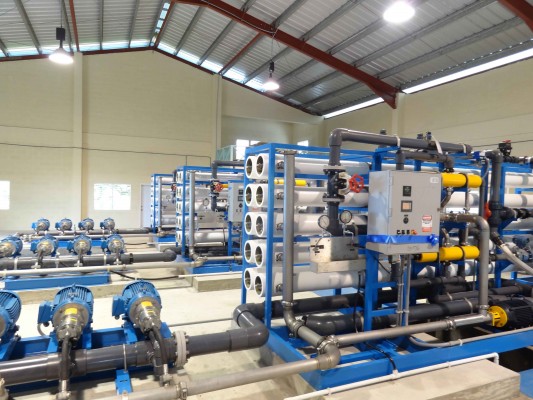APUA’s Water Manager details the performance of RO plants, confirming that production is currently not at capacity
The Antigua Public Utilities Authority (APUA) is answering claims by the United Progressive Party (UPP) that its reverse osmosis plants are not being adequately maintained.
The UPP has blamed the Gaston Browne Administration’s poor management of resources for the water crisis the country is now enduring.
Speaking at a drive-in rally in Freetown on February 24, Political Leader Harold Lovell said that, in some instances, RO plants are producing half of their normal daily capacity. For instance, he said, “the Crabbs plant is producing only two million gallons of water a day, which is about half of its 2016 output.”
According to Ian Lewis, APUA’s water manager, there are six units at the Crabbs Plant, four of which now produce 2.5 million gallons of potable water daily. When the two other units are brought back online, he says, the Plant will be up to three million gallons per day.
Reports say the membranes used to operate the RO plants grow increasingly inefficient with use although they are cleaned frequently.
APUA says that new membranes can be shipped in five to six weeks following an order, but they cannot be kept in storage for more than a few weeks before deteriorating. These are changed every three to five years, Lewis says.
According to Lewis, the Ivan Rodriguez Plant at Barnacle Point produces 1.4 million gallons of water daily with six units. Two of these are being maintained in a staggered fashion, allowing the plant to produce a significant portion of its maximum output.
The plant at Camp Blizard, the Manager says, has four units currently, and they are all functioning. Their membranes were replaced in 2018 and new ones should be installed within the next 12 months, he adds.
Meanwhile, Ffryes Beach seems to be the only unit that is performing at near-maximum capacity, with four units online and producing 90% or 1.6 million gallons per day.
Lewis claims this increase has caused the southern parts of the island to receive more potable water than in the past.
He reports that the plant at Pigeon Point produces more than 300,000 gallons of potable water daily, and this will be sufficient to meet the demands of the St. Paul communities, as well as the vessels participating in Antigua Sailing Week next month.
APUA has begun constructing a $14 million plant at Fort James and promises it will be fully commissioned before September.
Explaining the non-commissioning of storage tanks that were installed by the UPP, Lewis says that two unconnected tanks are being connected through polyethylene pipes, since it was determined that PVC pipes cannot be used.
He says the soil is rocky and will puncture the PVC pipes if there is earth movement.
Commenting on the fact that Lewis was summoned to Cabinet to defend the accusations raised by the UPP, a Party member says it “shows the level of disconnection between the Minister and APUA.
“And note that Mr. Lewis did not disprove our claims,” he adds. “It goes to prove that the Political Leader was right about the under-performance of the plants.”




